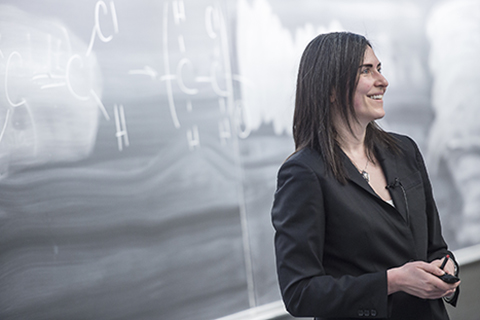April 22, 2016
Exceptional Early Career Award: Shelley Claridge
 |
|
Shelley Claridge, assistant professor of chemistry and biomedical engineering. (Purdue University photo/Charles Jischke) |
In recognition of outstanding undergraduate teaching, two professors recently received the 2016 Exceptional Early Career Award. This Q&A focuses on award recipient Shelley Claridge, assistant professor of chemistry and biomedical engineering.
Years at Purdue: 2½.
Teaching interests: My goal is to help students solve real-world problems in engineering, biology, and physics, by understanding the underlying chemical structures of objects around them down to the molecular scale.
What Claridge enjoys most about teaching: One of my favorite things about teaching has always been individual conversations with students and being there for the moment of discovery when a student transitions from not understanding to understanding. It's a phenomenal feeling. Making a personal connection is more of a challenge in big lecture courses, so I always like it when students come ask questions after lecture or in office hours. I participate in the Feasting with Faculty program, where students can have lunch with me in the dining court and talk more.
On the importance of interaction with students in a large lecture course: Getting students to ask questions in a large lecture hall is difficult because no one wants to raise their hand and say they don't understand something in front of hundreds of people. But when students are willing to do that, it helps the whole class because a lot of other students probably had the same questions. If I can get a few students to be brave enough to ask questions, it makes the whole class feel like they're part of the conversation. One thing I've always loved about CHEM 115 is that the students have such different perspectives. There are physicists, biologists, electrical engineers and food scientists all in the same classroom, so we get really great "what if …" questions across a whole range of topics that can take the class discussion in surprising new directions.
On the student impact of lectures developed by Claridge: My hope is that all my students finish the semester seeing chemistry everywhere around them and understanding the foundation it provides for their chosen field. With that in mind, we use examples of how chemistry is relevant to engineers and to scientists who aren't chemists. I use a lot of food chemistry examples, since that's part of everyone's daily experience. We've talked about why peaches smell amazing, or why people dislike cilantro, so students can see that chemistry isn't just something that happens in a lab with beakers and a lab coat. I also hope my students will learn not to let people intimidate them with chemistry. It's fairly common to find people implying that chemistry is hard to understand and that all chemicals are intrinsically bad for you. My goal is that when students are faced with a situation like this, their instinct is to learn more, rather than assuming all chemicals with complicated names are dangerous.
What Claridge believes makes a great lecture: The best lectures build towards understanding some application of chemistry, like how major proteins in your body function based on their chemical structure, and provide several points for students to actively check their understanding along the way. Even though our class is only 50 minutes, it's still a long time to try to focus without a break, so we usually work out an example problem, do a short movie or a demonstration every 10-15 minutes.
What her students say: Professor Claridge does a great job accepting questions and comments, so even though it is a huge lecture, it feels personal and conversational. She tries to make everything engaging, and she keeps our attention; she is not a boring lecturer. She makes chemistry approachable and practical, and she takes the time to go through the most-missed questions on the exam. It was very clear when she first came to be our professor that she wanted us to succeed. … I am not afraid to ask her questions anytime because I know I will get a good response back. Please continue to have Feasting with Faculty because it really does provide a good time for building a stronger relationship between the professor and the student, which then provides an easier and more motivated way for learning material.
Writer: Aspen Deno, denoa@purdue.edu

